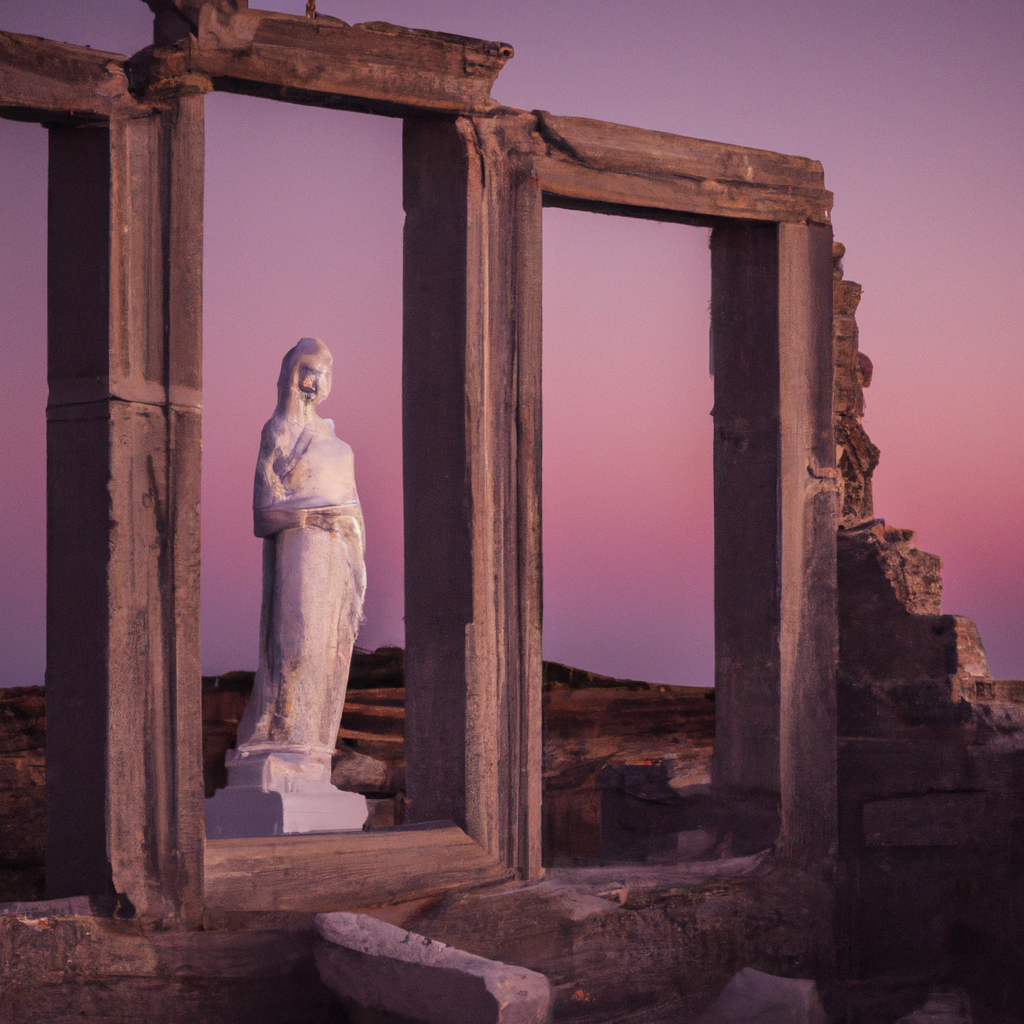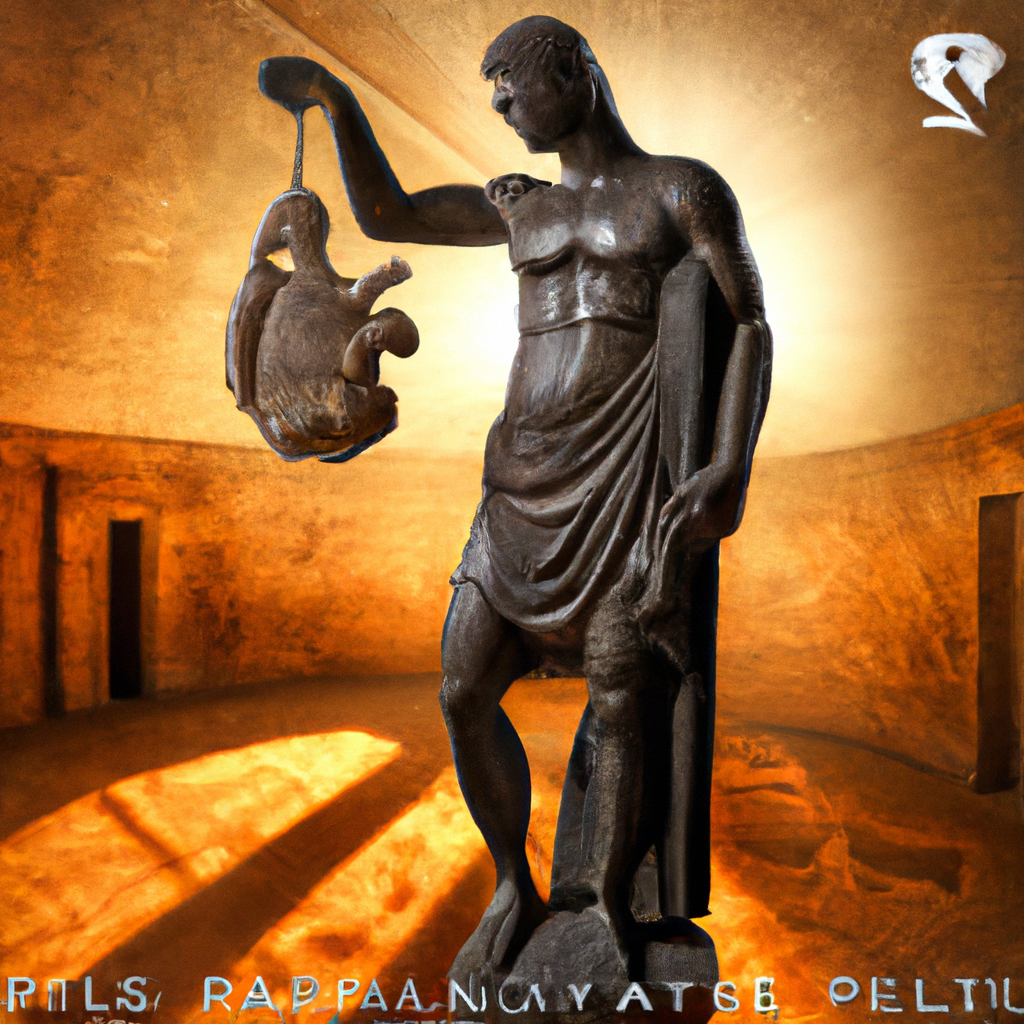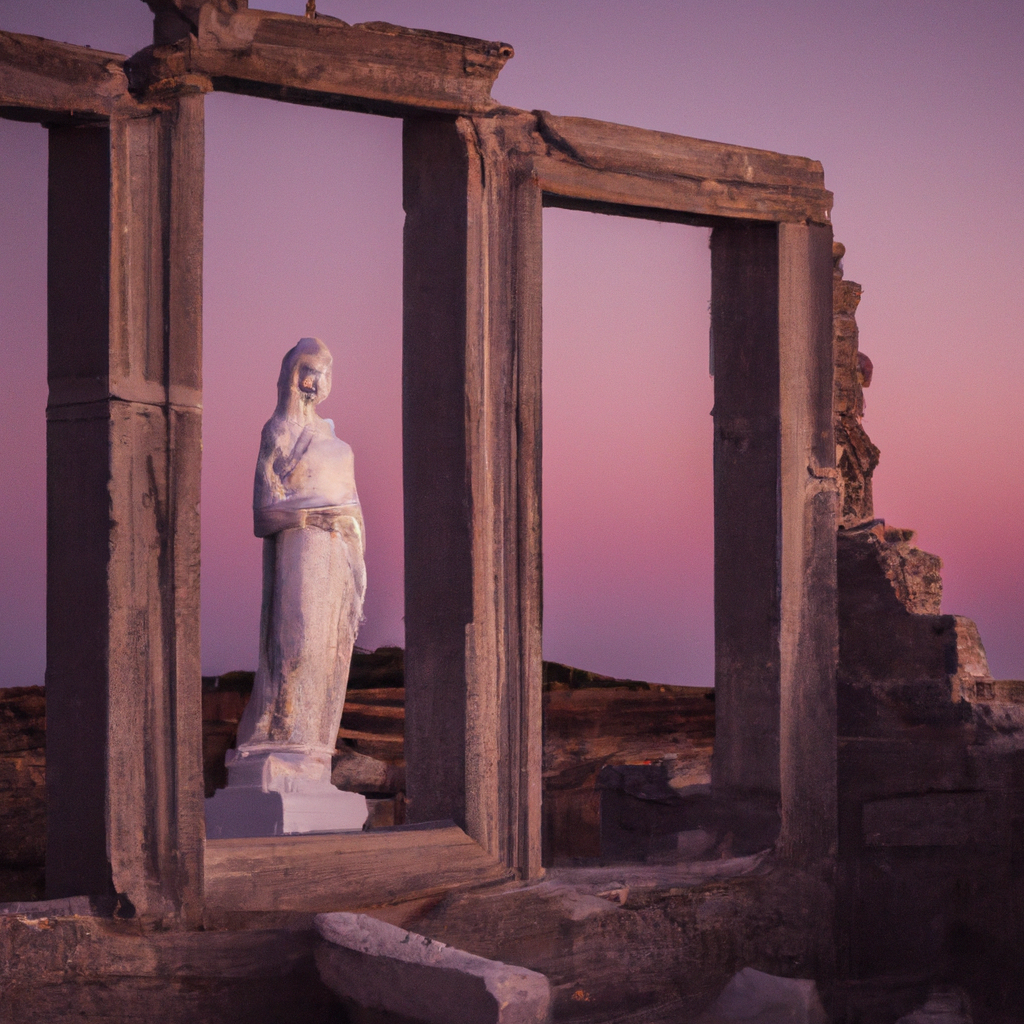As you step onto the sun-kissed shores of Delos Greek Islands, a world of ancient legends and mythological wonders unfolds before your eyes. This enchanting archipelago, nestled in the heart of the Aegean Sea, is steeped in historical significance and shrouded in timeless tales. Embark on a captivating journey through the mythological secrets of Delos, as you unlock the mysteries of gods and goddesses, immerse yourself in ancient rituals, and uncover the profound influence this sacred place held in the ancient world. Prepare to be mesmerized by a land where reality and myth seamlessly intertwine, leaving you with a deep appreciation for the rich tapestry of human imagination and belief.
The Birthplace of Apollo and Artemis
The Legend of Leto and Zeus
Welcome to Delos, the birthplace of two of the most revered and powerful gods of Greek mythology – Apollo and Artemis. Leto, a mortal woman, found herself in a predicament when Hera, wife of Zeus and queen of the gods, discovered her affair with Zeus. In her wrath, Hera banished Leto from Earth, preventing her from finding a safe place to give birth. But Zeus, unyielding in his love for Leto, intervened and guided her to the isle of Delos.
The Importance of Delos in Greek Mythology
Delos, this tiny, yet extraordinary island, holds immense significance in Greek mythology. It is said to be the place where Apollo and Artemis were born and where their altars stand. This sacred island served as a pivotal meeting point for gods and mortals alike, for it was here that Zeus ordered the island to remain unattached to any mainland to ensure its protection. Delos became a hub of pilgrimage and a center of worship for those seeking favor from the gods.
The Sacred Island
The Delian Festival
One of the most significant events held in Delos was the Delian Festival, a grand celebration in honor of Apollo. Every four years, thousands of people flocked to this remarkable island to indulge in processions, athletic competitions, and artistic performances. The atmosphere during the festival was vibrant, filled with music, dance, and cheers that echoed through the picturesque landscapes of Delos.
The Sanctuary of Apollo
At the heart of the island lies the majestic Sanctuary of Apollo. This sacred sanctuary housed a grand marble temple, within which resided the statue of Apollo himself. Pilgrims from all corners of Greece traveled to offer prayers and seek guidance from the god of light and music. The tranquil ambiance of the sanctuary provided solace and a sense of connection to the divine.
The Terrace of the Lions
As you explore Delos, you will stumble upon the enchanting Terrace of the Lions, a row of magnificent lion sculptures standing proudly as guardians of the island. These statues were crafted during the 7th century BC and offered protection to the sacred dwellings of the gods. A testament to the skill and artistry of ancient sculptors, the Terrace of the Lions is a sight to behold, immersing you in the rich history and mythical aura of Delos.

The Mythical Hierarchy of Gods and Goddesses
Apollo: The God of Light and Music
Apollo, the son of Zeus and Leto, was revered as the god of light, music, and prophecy. He was often depicted as a handsome young man, with a lyre in hand and a radiant crown adorning his head. Apollo’s presence on Delos was a testament to his power and influence, for he not only protected and guided the island but also bestowed his blessings upon all who worshipped him here.
Artemis: The Goddess of Hunting and Wilderness
Artemis, the twin sister of Apollo, held a prominent role in Greek mythology as the goddess of hunting, wilderness, and the protector of women. Known for her adventurous spirit and fierce determination, Artemis was often depicted with a bow and arrow, ready to defend and provide for her followers. Delos, as her birthplace, held a special significance for Artemis, as it was here that her divine presence resonated most strongly.
Hera: The Queen of the Gods
Hera, the queen of the gods and wife of Zeus, played a pivotal role in shaping the mythology of Delos. Although she is not directly associated with the island, her influence can be felt through her relentless pursuit to punish those who threatened her marital union. Her actions led to Leto’s banishment and ultimately guided the destiny of Apollo and Artemis, making her an important figure in the mythological tapestry of Delos.
Poseidon: The God of the Sea
Poseidon, the god of the sea, also has a place in the mythological hierarchy of Delos. As a brother of Zeus, he played a significant role in shaping the fate of this sacred island. Legend has it that Poseidon once roamed the seas surrounding Delos, protecting it from harm and ensuring its safety. His presence highlights the island’s connection to the sea, a vital element that influenced the lives and culture of the people who inhabited Delos.
The Symbolic Architecture
The Houses of Dionysus and Cleopatra
As you explore Delos, you will encounter architectural marvels that capture the essence of the island’s history and mythology. The Houses of Dionysus and Cleopatra, lavish and intricately designed, offer a glimpse into the lives of the wealthy and powerful who once resided here. These ancient residences, adorned with mosaics and frescoes depicting mythological scenes, serve as a portal to the past, allowing you to immerse yourself in the stories and grandeur of Delos.
The Temple of Isis
The Temple of Isis, located on the northeastern side of the island, pays homage to the goddess Isis, a deity from Egyptian mythology who gained popularity in the Hellenistic period. This magnificent temple stands as a testament to the island’s cultural diversity and serves as a symbol of the interconnectedness of ancient civilizations. The exquisite architecture and intricate detailing make the Temple of Isis a must-visit destination for history enthusiasts and architecture aficionados.
The Theater and Stadium
Immerse yourself in the theatrical traditions of ancient Greece as you visit the well-preserved theater and stadium of Delos. These grand structures were a testament to the island’s vibrant cultural and sporting life. The theater, with its stone seats and impressive acoustics, transported audiences to a world of drama, while the stadium hosted athletic competitions that showcased the physical prowess and dedication of its participants. Delos, with its iconic theater and stadium, stands as a reminder of the enduring legacy of Greek civilization.

The Stories of Heroes
Theseus and the Minotaur
Delve into the legends of Delos and you will come across the tale of Theseus and the Minotaur, a story of triumph over darkness and courage in the face of fear. Theseus, a hero from Athens, embarked on a treacherous journey to Crete, where he faced the mythical Minotaur in its labyrinthine prison. It was Apollo who guided Theseus, ensuring his success in slaying the fearsome creature and leading his fellow Athenians to victory. Delos, with its connection to Apollo as the birthplace of the god, holds a special place in this heroic tale.
Heracles and his Twelve Labors
Heracles, the mighty demigod renowned for his unparalleled strength, also found his way into the mythology of Delos. His journey through twelve arduous labors brought him to various corners of the ancient world, including Delos. One of his labors was to capture the Cretan Bull, a mythical beast said to have terrorized the island. Heracles, aided by the divine favor of Apollo, successfully captured the bull, thus leaving his mark on the legend of Delos.
The Island’s Role in the Trojan War
The Gathering of the Greek Forces
Delos played an essential role in the events leading up to the Trojan War. It was here that the Greek forces gathered before setting sail for Troy. The island’s strategic location, its divine connection to Apollo, and the safe harbor it provided made it an ideal meeting point for the numerous Greek armies. Delos witnessed the gathering of renowned heroes, stirring tales of bravery and camaraderie that would shape the course of the war.
The Departure of the Greek Armada
As the Greek armada set sail from Delos to embark on the legendary journey to Troy, the island itself stood as a symbol of hope and divine protection. Delos became the last glimpse of Greece for the warriors who left behind their loved ones and ventured into the unknown. Its significance in this crucial moment of Greek history showcases the island’s central role as a blending point of myth and reality, where mortal and divine forces converged.
The Modern Excavations and Discoveries
The Archaeological Site of Delos
In modern times, Delos has become a treasure trove for archaeologists and historians seeking to uncover the secrets of the past. The ongoing excavations have unveiled a plethora of ruins, including temples, houses, and marketplaces, providing invaluable insights into the daily life and religious practices of the ancient inhabitants of Delos. Exploring the archaeological site allows you to step back in time and witness the rich tapestry of life that once thrived on this mythical island.
The Unearthed Artifacts
As the excavations on Delos continue, archaeologists have unearthed a dazzling array of artifacts, ranging from delicate pottery to intricate sculptures. These discoveries offer a glimpse into the artistic and cultural achievements of the people who lived on the island thousands of years ago. Each artifact tells its own story, inviting us to imagine and connect with the lives and aspirations of those who once walked the hallowed grounds of Delos.
The Influence of Delos in Art and Literature
Delos in Greek and Roman Poetry
Delos has inspired countless poets and writers throughout the ages, who have woven the island’s mythology and beauty into their words. From ancient Greek poets like Pindar to Roman writers such as Ovid, Delos has been hailed as a muse, a source of inspiration that transcends time. The verses of these literary masters capture the essence of Delos, painting vivid pictures of its landscapes, its divine inhabitants, and the stories that make it an eternal symbol of ancient Greek culture.
Delos in Renaissance Paintings
The allure of Delos extended far beyond the realm of poetry and literature. During the Renaissance, artists sought to capture the mystique and grandeur of this legendary island on canvas. Paintings depicting mythological scenes set in Delos became a popular theme amongst artists, allowing them to explore the intersection of human and divine realms. The masterpieces of these Renaissance painters continue to enchant viewers, serving as a testament to the enduring allure of Delos in the world of art.
The Preservation Efforts and UNESCO World Heritage Site
The Protection and Conservation of Delos
Recognizing the inherent value and historical significance of Delos, efforts have been made to protect and preserve this sacred island. Strict regulations are in place to ensure the preservation of its archaeological remains, preventing any harm or disturbance to the delicate structures and artifacts that lie beneath the ground. These preservation efforts allow visitors to witness firsthand the marvels of this ancient civilization while ensuring that the legacy of Delos can be cherished by generations to come.
Recognition as a World Heritage Site
In 1990, the United Nations Educational, Scientific and Cultural Organization (UNESCO) bestowed the title of World Heritage Site upon Delos. This prestigious designation recognizes the island’s universal value and its pivotal role in shaping the history and mythology of ancient Greece. Delos, with its wealth of archaeological treasures and its profound connection to Greek mythology, stands as a testament to the enduring legacy and importance of this remarkable island.
The Continuing Legacy of Delos
Pilgrimages and Cultural Festivals on Delos
Even in modern times, the legacy of Delos endures, with pilgrims and culture enthusiasts continuing to flock to this sacred island. The once-great Delian Festival has been revived, providing an opportunity for visitors to immerse themselves in the vibrant traditions of ancient Greece. Music, dance, and theatrical performances fill the air, honoring the gods of old and celebrating the rich cultural heritage of Delos.
Delos in Modern Greek Culture
Delos remains an integral part of modern Greek culture and identity. Its myths, legends, and historical significance are woven into the fabric of Greek society, resonating in art, literature, and even everyday life. The spirit of Delos prevails, inspiring a deep sense of connection to the ancestral roots and the mythical tales that have shaped Greek culture for millennia.
In conclusion, Delos, the birthplace of Apollo and Artemis, stands as a timeless testament to the power of mythology and the enduring legacy of ancient Greece. From its sacred sanctuary to its symbolic architecture, Delos captivates visitors with its rich history and mythical allure. As you explore this remarkable island, immerse yourself in the stories of gods and heroes, and witness the ongoing preservation efforts that honor its past. Delos embodies the timeless beauty and cultural significance that continue to shape our world today.
